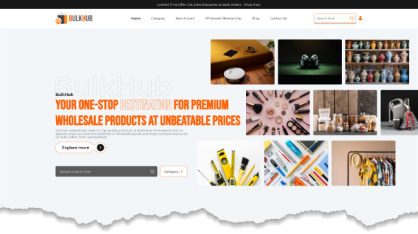
In today's Internet-driven marketplace, you can't afford to not have a web presence for your company. WordPress and Shopify are two of the most well-known e-commerce systems available. WordPress, which has been around since 2003, is a CMS that has developed into a robust system for building websites, blogs, and online shops.
In contrast, Shopify is an e-commerce platform developed for the express purpose of making online shops. Creating an online store with WordPress or Shopify is a fantastic option to give your company a strong online presence.
In this post we will take closer look at the pros and cons of each platforms that will help you to determine which one is better for SEO.
Comparison of WordPress and Shopify for SEO
WordPress and Shopify are two prominent e-commerce systems, each with its own set of features and perks. However, how well these platforms perform in terms of SEO is essential.
WordPress Overview
When it comes to search engine optimization, WordPress themes gives you a lot of leeway as a content management system. In addition to incorporating keywords into your content and optimizing your website's title tags, meta descriptions, and URLs, it also lets you add alt text to photos. Yoast SEO and All in One SEO Pack are the best examples of the numerous WordPress plugins available. This is because they provide sophisticated SEO capabilities and tools to your site.
Shopify Overview
In contrast, Shopify is an e-commerce platform developed exclusively for creating online shops. It may not be as adaptable as WordPress, but it has SEO tools designed specifically for online stores. In Shopify, you can tailor your website's meta descriptions and title tags and it will generate XML sitemaps automatically for your online shop. In addition, Shopify offers pre-built connections to third-party SEO applications like SEO Manager. This provides sophisticated functions, including schema markup and Google Analytics integration.
WordPress and Shopify: Comparison
Shopify and WordPress, taken as a whole, both have advantages and disadvantages regarding search engine optimization. WordPress is an excellent option for organizations who desire full control over their website's SEO optimization since it provides greater control and flexibility over SEO. On the other hand, Shopify is optimized for online retailers and comes with unique features to the platform.
The SEO demands of your organization will be the deciding factor between using WordPress vs. Shopify. WordPress might be the best option if you want full control over your site's SEO and are ready to put in the time and effort to improve it. On the other hand, Shopify offers a user-friendly SEO strategy since it is built from the ground up for online retail. Focusing on SEO optimization is critical for increasing website traffic and sales regardless of your platform.
Difference between WordPress and Shopify
WordPress and Shopify dominate separate but related internet markets. In this section, you will learn the difference between WordPress and Shopify.
Content Creation and Optimization
In its most basic form, WordPress is a content management system (CMS) that lets its users write and publish articles, pages, and other forms of material. WordPress's robust editor lets users change font sizes, upload images, and change the site's color scheme, among other things. In addition, WordPress has several SEO plugins, such as Yoast SEO and All in One SEO Pack, that help users enhance their content's visibility in search results by adjusting meta tags, page titles, and meta descriptions and generating XML sitemaps.
In contrast, Shopify is an e-commerce platform for setting up online shops. Shopify has a content publishing feature that lets users add pages, blog entries, and more, but it lacks the versatility and personalization of WordPress. In addition, Shopify's SEO functions are tailored for e-commerce optimization, including modifying URLs, meta titles, and product descriptions.
URL Structure and Permalinks
Because it tells search engines what the page is about, URL structure is crucial to search engine optimization. Permalinks are configurable WordPress settings allowing users to alter the default URL format. The default WordPress permalink format contains the post ID, but users may also choose a date-based or user-defined permalink structure.
Users of Shopify have limited leeway in deciding how their URLs will be structured. Shopify does not support user-defined URL structures; the platform automatically constructs URL slugs using the page, product, or blog post's title.
Meta Tags and Descriptions
With the right meta tags and descriptions, search engines will have a better idea of what a page is about, boosting the page's ranking. Plugins like Yoast SEO and All in One SEO Pack make it easy for WordPress users to optimize their content for search engines by adding meta tags and descriptions to individual pages and articles. There is a character count limit in Shopify regarding meta tags and descriptions for pages, items, and collections.
Mobile Responsiveness
A website's responsiveness to mobile devices describes how effectively it displays and functions on such devices. The importance of mobile responsiveness in search engine optimization has grown as the number of people using mobile devices to access the internet has increased.
WordPress provides a selection of mobile-friendly, responsive themes, and users may also modify existing WordPress themes to improve their site's mobile-friendliness. WPTouch and Jetpack are just two of the numerous WordPress plugins that may aid in making a site mobile-friendly.
However, Shopify is built with mobile compatibility in mind from the ground up. Shopify's themes are all mobile-friendly, and users may check the appearance of their site on a variety of devices before publishing it.
Site Speed and Performance

Site speed and performance are paramount regarding search engine optimization and user experience. Websites that are easy to use and load fast tend to have higher search engine rankings and a higher retention rate of visitors.
Because WordPress is so flexible, users can fine-tune the platform to maximize their site's speed and performance. Visitors who want their websites to load quickly should choose a web host with fast servers and CDN (content delivery network) capabilities. Further, caching content and compressing files with WordPress plugins like WP Super Cache and W3 Total Cache can help speed up a website loading.
Since Shopify is a hosted platform, its users don't have as much say over their site's loading time and performance as they would with a self-hosted solution. On the other hand, Shopify has lightning-fast servers and an integrated content delivery network (CDN) solution, both of which may boost load times. As a bonus, Shopify's themes are built with performance optimization in mind.
Security and SSL
Protecting private information and blocking unwanted visitors are two of the most important functions of website security. An SSL certificate is also crucial for search engine results and the safety of online transactions.
Since it is open source, WordPress users are responsible for keeping their sites secure. Wordfence and iThemes Security are just two of the many security plugins available for WordPress that may help keep a site safe from hackers and viruses. In addition, Let's Encrypt provides free SSL certificates for WordPress.
However, since Shopify is a hosted platform, all responsibility for website security rests with Shopify. Shopify employs SSL certificates to encrypt data transmissions and provides many safeguards against malware and hacking attempts, including two-factor authentication and regular backups.
Backlinks and External Linking
Regarding SEO, backlinks, or connections from other websites to yours, are valuable indicators of your site's authority and relevance. Search engine results may be improved by external linking or connecting to other websites from your own.
Several WordPress plugins are available for WordPress to assist with external link management and broken link monitoring. WordPress users may alter default permalink structure means that they can create URL that is informative and easy to remember.
However, Shopify does not provide the same degree of management over third-party links. However, Shopify users may include external links in their content, which can boost their search engine results by directing visitors to related sites.
Pros and Cons of WordPress for SEO
Pros
Open-Source Platform
WordPress's open-source nature means that its code may be freely shared, modified, researched, and used by anyone. Saving time and money on development is possible by reusing an existing code. Working with a company or outside party to build a website might also benefit.
SEO Plugins and Tools
The robust Yoast SEO plugin is available to those who run an online shop on the ecommerce WordPress themes platform. For a good reason, Yoast has become the world's most popular SEO tool. Compared to other SEO tools, Yoast is in a league of its own thanks to its extensive customization options, including renaming and meta-tagging options, image compression, server optimization, and database access.
Ability to Fully Customize
WooCommerce was developed with SEO in mind. Compared to Shopify's limited access, the abundance of plugins makes modifying your platform's design simple and quick, allowing for greater SEO optimization.
Blogging Capabilities
WordPress is particularly well-suited to the task of blog creation due to its origins as a blogging platform. WordPress offers a robust in-built blog functionality that users may use even if their site is not meant to serve as a primary blog. This eliminates the need for users to create a separate blog to include one within their site.
Cons
Learning Curve for Beginners
It may be difficult for those without expertise or understanding in online development and marketing to find their way around WordPress, much alone WooCommerce, regarding site design, development, and upkeep. Due to its limited maintenance assistance, you must seek advice from user communities.
Maintenance and Updates
Updates are necessary to maintain maximum security and compatibility with WordPress for your online business, but they may sometimes be overwhelming. Using WordPress for online stores takes more effort when there are frequent upgrades.
Security Vulnerabilities
Since WordPress is one of the most popular, hackers will likely target it. While the project's open-source nature has its advantages, it also makes it more vulnerable to hacking. It also opens additional entry points for malware since it relies on plugins developed by untrusted sources.
Website Speed and Performance Issues
Self-hosted WooCommerce shop may have slower page loads due to issues with the hosting server, site plugins, image compression, or database optimization.
Pros and Cons of Shopify for SEO
Pros
Easy to Use and Set Up
Shopify makes it simple to build an e-commerce website. Compared to WordPress, optimizing Shopify's website is a breeze because of the platform's user-friendly drag-and-drop builder, hosting, and eCommerce functionality.
Built-in SEO Features
Shopify's built-in SEO tools are powerful and simple to utilize. Your sitemap will be created mechanically. If you want search engines to be able to navigate your site effectively, you need a sitemap.
Fast Loading Speed and Performance
Shopify is a lightweight model application that runs on flexible software. It loads far quicker than competing shopping carts like WooCommerce. Google's ranking of your website also considers how long it takes for pages to load. To reduce load times, Shopify has built-in caching functionality, which stores a cached version of the web page whenever a client visits.
Secure Hosting and SSL
SSL is a standard protocol file used to encrypt, secure, and authenticate data sent over the Internet. They are placed on the primary server where a website is hosted and contain information about the site's owner. SSL certificates are included in the Shopify plan and are issued by Shopify.
Cons
Limited Customization Options
Unfortunately, Shopify's users cannot modify the platform's SEO settings. Designers who attempt to enhance their site with technical SEO upgrades will be dissatisfied if the site is not user-friendly, as it is intended to be.
Higher Cost for Advanced Features
The pricing of each platform is an essential part of the Shopify vs. WooCommerce analysis. The cheapest Shopify plan is $29 per month. You pay more for convenience, but you can't tweak the finer points of your SEO, so it's not competitive with WooCommerce's flat rate.
No Blogging Capabilities
When it comes to search engine optimization, the quality and quantity of information on a website is of paramount importance. Site owners that maintain a blog may easily optimize it for search engines by including keywords, backlinks, and other optimization tools. Shopify's weak spot is its lackluster weblog features.
Conclusion
You will eventually get the desired results if you continually use good SEO strategies. The greatest e-commerce systems, like Shopify and WordPress, are always evolving to meet the needs of their consumers. With so much time spent debating the relative merits of Shopify and WordPress from an SEO perspective, it might not be easy to settle on a single platform.
Your company's specific requirements should guide your platform selection. WordPress gives you total command over your site's SEO settings, but Shopify makes it easy to get the job done quickly. WordPress, however, provides a large amount of room for your material, while Shopify provides a wide variety of helpful tools. While Shopify is known for its lightning-fast page loads, WordPress is king in content marketing. Both platforms also feature cutting-edge SEO tools for increasing your online shop's visibility.
When deciding between Shopify and WordPress for search engine optimization, your needs are the only thing that should matter. It is important to explore every part of the platforms thoroughly. Considering costs is essential in selecting the best e-commerce solution for your company. WordPress is great if you want a highly customized site, but for advanced functionality on your site, Shopify is the way to go.









